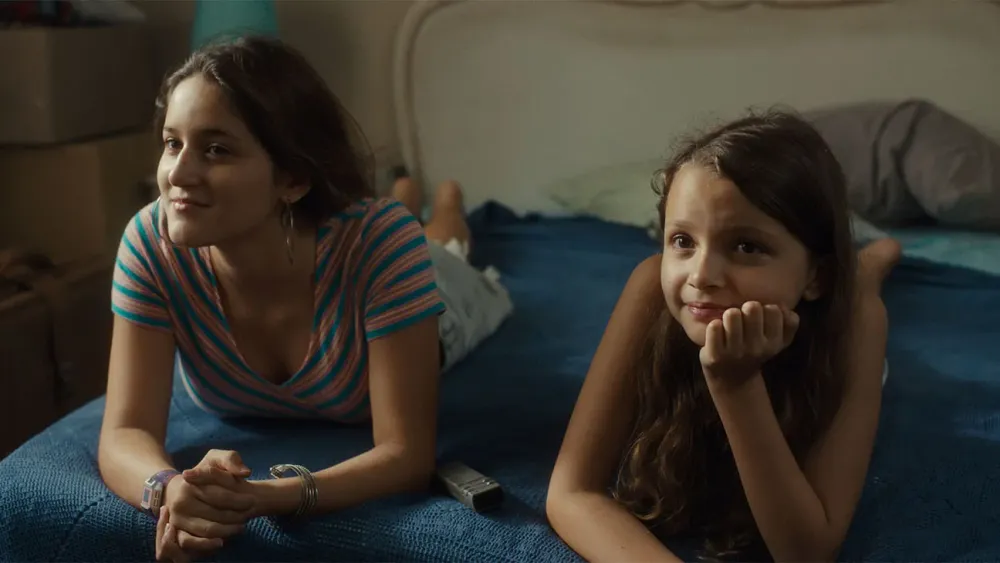Reinas (Queens) is a caring, tender, and joyous Peruvian drama that celebrates those who strive for a better life. Following two young sisters, Aurora and Lucía, who reconnect with their absent father Carolos just as they’re about to leave the country; Reinas is a story about love, family, place and reflection captured under the looming spectre of political violence. Directed by Swiss-Peruvian filmmaker Klaudia Reynicke; the film draws on her real-life experience of emigrating from Peru when she was ten years old, telling a domestic tale where the act of letting go is also an act of devotion.
In Lima, Peru in 1992, a news broadcast states that the cost of basic goods is increasing at exorbitant prices. Milk, white sugar, even a baguette - the currency of the Peruvian inti has reached untenable levels of hyperinflation. The broadcaster has nothing left to say but ‘May God help us all’. Peru itself is in a state of political and economic crisis. The Shining Path is in constant conflict with the government of Alberto Fujimori and his death squad, Grupo Colina. Military personnel patrol the streets, nightly curfews are in place, and power outages are common - most civilians are living in fear of imprisonment or violent outbreak.
Enter cab driver Carlos (Gonzalo Molina), a grifter who turns up at the doorstep of his ex-wife Elena (Jimena Lindo) to see his two daughters, Aurora (Luana Vega) and Lucía (Abril Gjurinovic). Carlos is a charismatic, chronic liar. He spouts wild claims of being a hunter, an actor, an export company worker, and a secret agent. All of which aren’t true. His cons and schemes test the patience of the family members who can clock his familiar antics - particularly Elena’s mother María Elena (Susi Sánchez) who can see right through him. Mostly being a product of a system that has left him in poverty, Molina does a good job to humanise Carlos even when he’s being an unreliable parent - his lies are often a mask to cover the shame of his lived reality. His truth, and humanity, remains in the love he has for his daughters.
Reinas succeeds at grounding the drama of the upper-middle class family through the wide-eyed perspective of the two daughters. Aurora is just turning fourteen – she loves going out with friends, is starting to drink, and her womanhood is, in her eyes, fast approaching. Carlos’ more free-spirited behaviour speaks to the reckless teenager inside her. This begins to excite Carlos as his older daughter questions wanting to stay in the country, to the outcry of Lucía.
As the younger sibling, Lucía still wants to stay with her mother. Embodying the innocence and whimsy of childhood, she loves to dream, have fun, and even tries talking to the spirit of her departed Aunt. Despite having some lively times out with her father such as going to the beach when Elena has banned it, or going on a joyride through some sand dunes, Lucía still clings to her family as Aurora starts to detach. Every character is pulled in different directions, but Reynicke avoids letting the film ever slip into melodrama.
All this puts a strain on Elena, who is making plans for her and the girls to immigrate to the United States. Whilst Carlos clings to a fantasy, Elena is a pragmatist. Even while living in privilege, she understands the daily terror that is growing around her and is willing to sacrifice anything so that her daughters can live a safe and happy life. They all still love Peru for its place, its culture, and its community, but Elena is willing to put the needs above the wants. Carlos needs to sign the paperwork that allows them to leave the country, but he is too preoccupied trying to keep his ‘queens’ smiling. He genuinely wants to create some loving memories with his children, but he is in denial that the longer he keeps them in Peru, the more dangerous it becomes for them.
With absorbing cinematography by Diego Romero, he captures the beauty and the frailty of Peru by mixing the splendour of the cloudless outdoors with the more dimly lit interiors. At one point the political crosses the personal - the film handles these moments with tension, stress and an acute, realist, cinematic eye. Every performance brings life to this family, as much as the camera gives life to Peru. Its humanist direction makes the audience care about a fractured family whose fractures are the result of a system upending its citizens.
Living under the weight of political oppression is so hard. Families become symbols for the nation. Reinas is an emotional, grounded, and candid film about letting go, caring in different ways, and forging new paths. Both Aurora and Lucía are full of youthful optimism, and their parents deep down know the sacrifices that must be made for those they love and want a future for. As Carlos reminds his daughters, Reinas salutes those who “kept their feet on the ground but looked up to the sky.”
Director: Klaudia Reynicke
Cast: Abril Gjurinovic, Luana Vega, Jimena Lindo
Writers: Klaudia Reynicke, Diego Vega Vidal
Producers: Thomas Reichlin, Britta Rindelaub, Daniel Vega Vidal, Diego Vega Vidal
Cinematography: Diego Romero
Editors: Francesco De Matteis, Paola Freddi
Streaming Availability:

